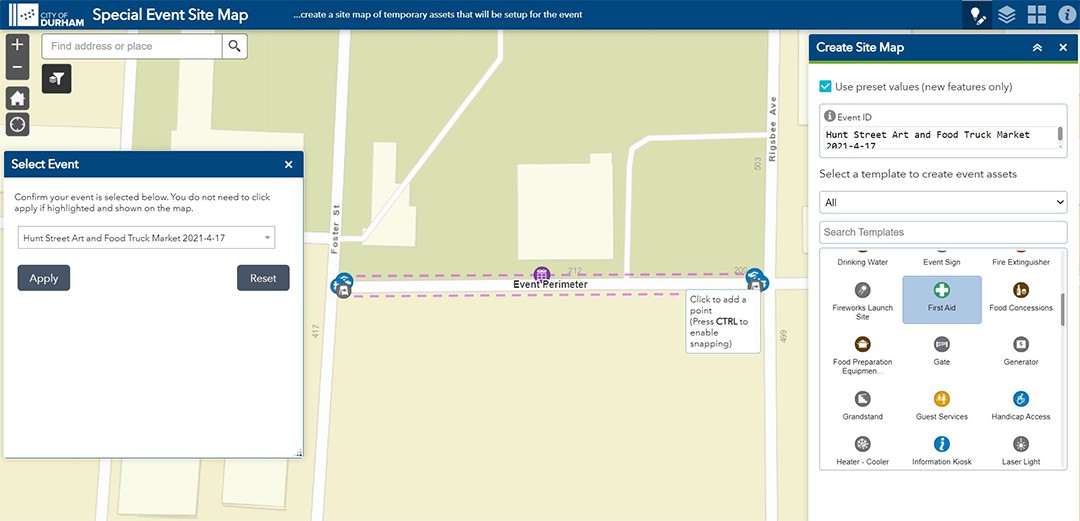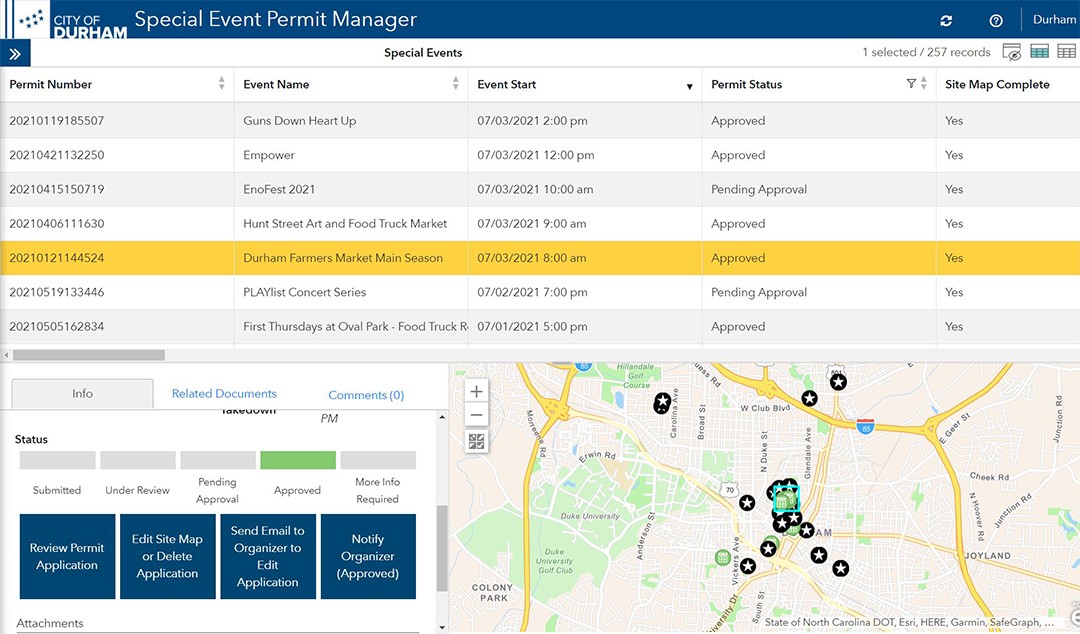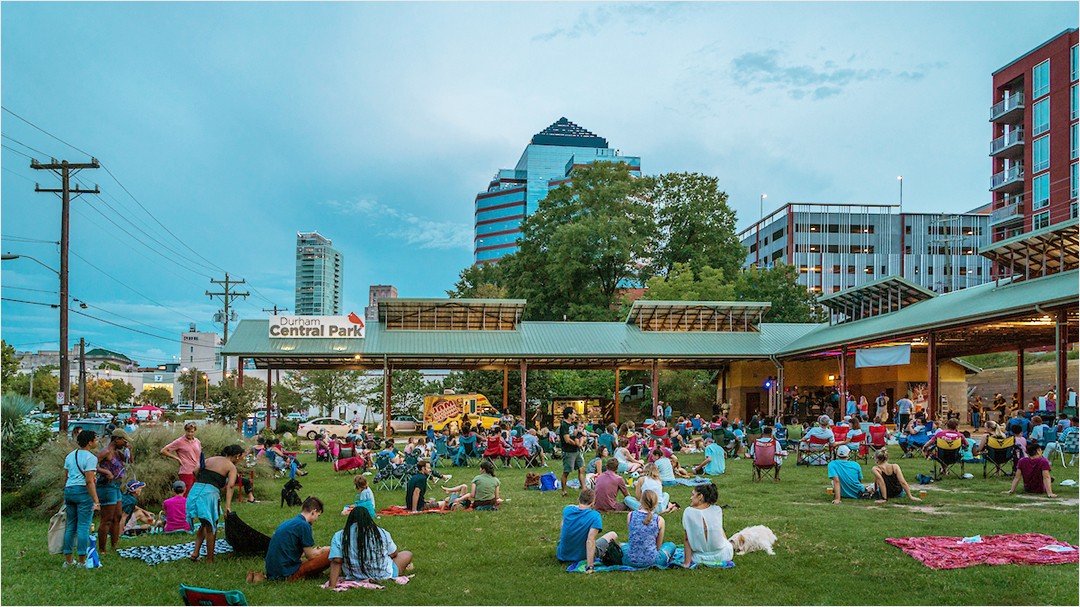I think that our new page made with ArcGIS Hub drastically improves how event organizers see special events at the City of Durham. It's more attractive, comprehensive, and user-friendly.
user story
City of Durham Enhances Event Planning Process with New Centralized ArcGIS Hub Site and Special Events Solution
From comedy shows to musical concerts and art exhibits, the City of Durham in North Carolina hosts more than 5,000 events a year. Durham has renewed its focus on increasing tourism and boosting the local economy by giving event organizers the resources they need to safely host exciting attractions and engaging cultural events.
Because special events often require the use of city services—police services or solid waste receptacles, the closure of city streets and sidewalks, or the use of city property—a necessary part of the event planning process is receiving permit approval from the City of Durham. The Special Event Review Team, or SERT, was created five years ago to approve private events requiring any of these resources, and approvers include staff from various city departments such as the local fire department and law enforcement.
The previous method of applying for a permit was a paper-based workflow that Mariel Klein, business services analyst with the City Manager's Office, wanted to make more efficient. Klein, who managed the rollout of the new solution, worked with the city's Technology Solutions Department to create a centralized event site and a streamlined digital process for the review and approval of event permits. This has given both users and event organizers a more user-friendly experience and a comprehensive view of year-round events in the "Bull City."
Challenge
In the previous workflow, an event organizer would fill out an online PDF for a permit application, which was routed to an administrator in the police department to send to members of the review team for approval. Reviewers would provide event-related comments by email or phone, and, upon approval, a member of the police department would sign the actual permit and send it back to the reviewer.
This workflow was time-consuming, which was a particular issue because there was no one person at the City of Durham whose job was solely to approve events. The main SERT members included Klein, a police lieutenant, and a part-time administrative assistant, who were working on event permits in addition to other daily duties.
"In addition to just increasing efficiency for efficiency's sake, an upcoming goal in implementing a new tool is going to be freeing up staff time since no one's full-time job is special events," says Klein.
User
City of Durham, North Carolina
Challenge
Older paper-based and PDF special event permit application workflows were cumbersome, time-consuming, and difficult to keep track of.
Solution
The new ArcGIS Hub site and Special Event Permitting solution have streamlined approval processes and provided a more user-friendly interface for special event permit requestors and reviewers.
Result
Event organizers can now submit their requests more easily, city staff time is freed up, and the public can see all the events happening in the community on a single, centralized calendar on the city’s hub site.
In addition, staff would have to sift through binders full of paper permit applications to view relevant paperwork for past events and event organizers. Klein explains that Durham has many recurring annual and monthly events, so a special event organizer would have to resubmit an entirely new application each time they wanted to hold an event.
With a natural break in special events during the COVID-19 pandemic, Klein believed it was the perfect time to streamline the event permit approval process with a new solution.
"It's become apparent that the city can do a lot more in the private special events space. And so it seemed like a good time to implement any efficiencies that we could," says Klein.
Solution
Klein reached out to her colleague Kelly Doss, a GIS analyst with the city's Technology Solutions Department, for help. Doss, who had been researching and promoting ArcGIS Solutions for Local Government beginning with a solution aimed at voter outreach and election management, began looking into what solution could help SERT. ArcGIS Solutions is a collection of focused maps and apps designed to improve operations and services in industries like government, utility, and public safety.
"Mariel [Klein] reached out to see if there's something available for special events, and I noticed there had been a major refresh of the Special Event Permitting solution, so as soon as Esri announced that it had been updated, we deployed it," says Doss.
As the City of Durham is a user of Esri software, Klein found available licenses they were able to take advantage of for this initiative. She explains, "Local government cost was a big factor for us in that our special events team is not centralized. So, our budget was zero, which made the Esri tool very appealing for us."
Doss helped configure and customize the Permitting web apps for managing permit applications included with the Special Event Permitting and Operations solution; the city chose not to implement the Operations web apps for managing events at this time. Doss decided to host the public-facing events on a dedicated web page created using the Promoting Special Event ArcGIS Hub site included with the solution.
The easy-to-use site editor included in ArcGIS Hub allowed Doss to start with a website template featuring information like event calendars and statistics, and then add other items the team wanted. ArcGIS Hub is an easy-to-configure cloud-based community engagement and collaboration platform that helps customers work more effectively with their communities.
"We found that it was going to be advantageous to us to use ArcGIS Hub to have a more updated website with everything in one place and then also as a way to have the external event organizers be able to engage with us," explains Doss.
Doss included a link to the Special Event Permit form on the hub site. Users can submit their permit applications by clicking the link and filling out the form included with the solution that Doss customized using ArcGIS Survey123, a form-centric data gathering solution. The form includes relevant details related to their city's specific event permitting requirements.
 The Special Event Site Map app provides a point of reference for planning and operating each event. For the City of Durham, this feature helps event organizers safely bring back events during COVID-19 while being mindful of capacity and social distancing.
The Special Event Site Map app provides a point of reference for planning and operating each event. For the City of Durham, this feature helps event organizers safely bring back events during COVID-19 while being mindful of capacity and social distancing.
The only customizations Doss made to the Special Event Permitting and Operations solution were small modifications to reflect the city's process of approving event permits. She says the array of functionality included with the solution was a tremendous help.
"The preconfigured pop-up HTML code and ArcGIS Arcade expressions and Survey123 form included with the solution are great for building on and customizing for our needs," says Doss.
The new hub site includes a public-facing calendar of events, guidelines for event organizers wanting to submit a permit application, and information regarding COVID-19. The event organizer page and event site map feature let event requestors who receive Hub Premium community member logins from the city create a map of their event with temporary event features like food concession or a first aid station. For internal use, the permit manager includes features to update the permit application status, to send emails to event permit reviewers with a custom link to the permit application, and to send emails to event requestors with a custom link to edit their submitted permit application if needed.
Results
The Special Events in the City of Durham hub site went live on January 1, 2021, and SERT has processed 276 applications for event permits in just four months. The new hub site and the Special Event solution implemented have improved processes, from streamlining the approval process to providing a more user-friendly interface.
The new process includes the following: event organizers submit their application online for faster processing; city event reviewers then access the back end manager function and approve the permit application; and emails are sent using the formatted email templates available through the Special Event solution informing the event organizer of the approval. Once approved, the event is automatically shown on the public event calendar.
Doss did not have any prior experience using Hub or configuring web apps before joining the city in 2018, and she says she found the special event solution and the ArcGIS Hub product simple to use.
"I found the solution and how everything ties together to be user-friendly. You don't have to know how to configure everything to use the solutions," says Doss. "So from that standpoint, I really appreciated all the efforts that have been put into these solutions. It's easy to grow and customize everything that is preconfigured to meet your needs."
Klein adds, "From the front end, any time we needed something else done or something tweaked, Kelly [Doss] was able to find a solution or a workaround. I've been nothing but pleased with its ability to grow, change, and adapt to how we need it to function."
Klein also likes that Hub has given SERT a centralized place to review, approve, and collaborate on permit applications, giving organizers and the event team a better user experience.
"I like that [Hub] is centralized and comprehensive. I think it's pulling together a lot of pieces that used to be scattered all over the place," says Klein. "It's way more user-friendly both in actually using the tool and just aesthetics."
 The Special Event Permit Manager has allowed the City of Durham to efficiently manage the permit process and collaborate across departments, creating a centralized process without a backlog of permit applications.
The Special Event Permit Manager has allowed the City of Durham to efficiently manage the permit process and collaborate across departments, creating a centralized process without a backlog of permit applications.
With different departments involved in the approving of event permits, the hub site has also improved collaboration. Approvers can add comments regarding the application, and stakeholders can review them. And the original approver can go back to the application and make additional comments or modify their decision. Klein says it has made the application process more cohesive.
"Now, we don't have to track down reviewers who have not yet reviewed a permit or track down email and phone records of approvals. [It's greatly improved] our record keeping," says Klein.
The increased access to data has also enhanced approvals. Previously, Klein said the special events team didn't have data such as how many events they were approving or where events were. Now, Hub has improved the team's access to vital event data, and the ability to put all events on one map and see where events are taking place helps with planning strategy.
"I like that Hub, and especially the community hub page, is now allowing us to have a way for external people to interact with our data," says Doss. "So going forward, that aspect of it is going to be great for the organization."
The event calendar on the new special events hub page allows SERT and all stakeholders to view all scheduled events easily on one map. The previous platform included a map view that linked to an online digital map when a user entered an address—a user could only view one event at a time. Now, Doss says a user can zoom into their neighborhood and see all Durham events going on and also filter events by day, week, or month.
Klein adds that this comprehensive view of city events has improved event management. Upon receipt of an application, SERT can now immediately tell event organizers if there are too many events happening during a specific period and suggest the event be rescheduled due to resource constraints.
"Just seeing how many events there are on a certain day or a certain weekend is really useful," says Klein. "And that was not something that we could do very easily in the past because it required just filtering through PDFs or even paper applications. And so, this is a big win for us."
 One of the many events at Durham Central Park, a very popular event location. Photo by Discover Durham. Photo credit: Discover Durham, durhamncphotos.com.
One of the many events at Durham Central Park, a very popular event location. Photo by Discover Durham. Photo credit: Discover Durham, durhamncphotos.com.
Looking ahead, some of the City of Durham's community partners such as Discover Durham are using the new hub site as a tool to help event organizers bring events back safely during the COVID-19 pandemic. The event site map feature is also helping organizers safely organize events by using a map to see, for example, how many people can attend an event and still maintain social distance.
"We are working on ways to cultivate events, especially after COVID-19, and having a more efficient and robust application process is just one of those ways. I think we're just hitting the tip of the iceberg right now because we're just starting to get events in. It can only get better from here," says Klein.